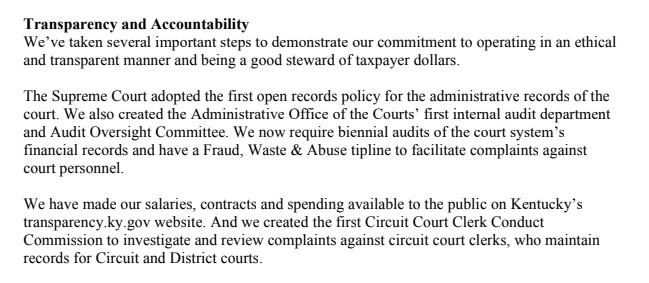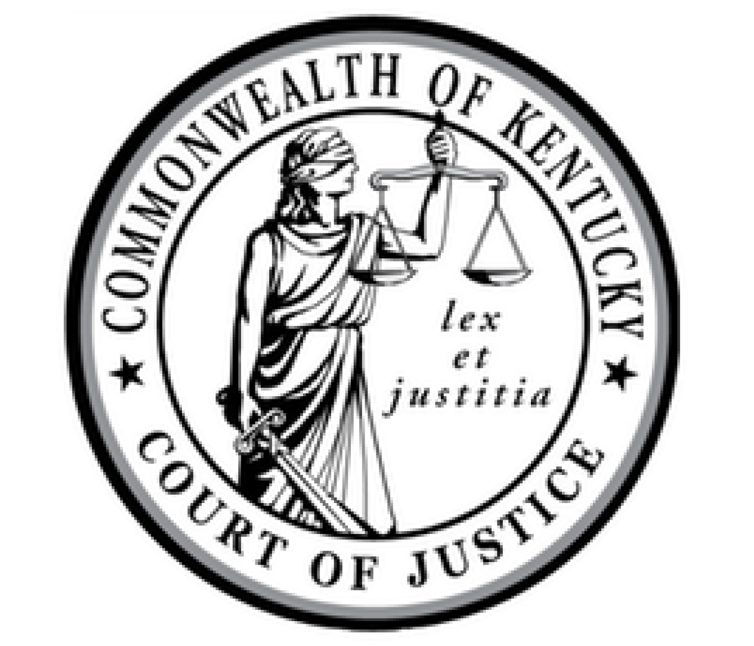

In his final State of the Judiciary Address, Kentucky Supreme Court Chief Justice John Minton reflected on his achievements while on the Court. He focused, in part, on improvements in judicial branch transparency and accountability under his leadership.
The Chief Justice leaves an open government legacy of which he can be proud.
As many know, the open records law has — since it’s enactment in 1976 — defined "public agency" to include "every state or local court or judicial agency," but the courts and judicial agencies excluded themselves from the application of the law in a 1978 ruling issued by the Kentucky Supreme Court: Ex Parte Farley.
https://law.justia.com/cases/kentucky/supreme-court/1978/570-s-w-2d-617…
Under Chief Justice Minton’s leadership, the courts’ “Farley Freeze” began to thaw.
Long before he secured adoption of Supreme Court Order 2017-09, opening — at least to some extent — the records of the Administrative Office of the Courts to public inspection, Chief Justice Minton ensured the participation of the Judicial Branch in Kentucky’s Open Door or Transparency Portal — a “bipartisan, multi-agency effort to provide a more transparent, accountable state government” launched in 2009 by former Governor Steve Beshear.
https://transparency.ky.gov/Pages/default.aspx
https://m.facebook.com/nt/screen/?params=%7B%22note_id%22%3A10158878039…
https://kyopengov.org/blog/transparency-websites-state-and-local-level-…
At the time, the legislative branch elected to exclude itself from the state portal, developing sometime later its own transparency link. It, too, now shares information with Transparency.ky.gov
https://apps.legislature.ky.gov/Expenditures/default.aspx
In 2010, Chief Justice Minton “ordered a change that will assure public access to the names of the parties and docket numbers of sealed cases, except those required by law to be confidential, such as some involving juveniles.
“Minton also sent out a reminder that the existence of court cases and records should never be made secret and that court records should be closed ‘only for compelling reasons.’”
https://amp.kentucky.com/opinion/editorials/article44067525.html
And it was Chief Justice Minton who — following embarrassing revelations of court employee-only surplus property sales — joined other judicial officials in requesting that Kentucky Auditor of Public Accounts, Mike Harmon, conduct an audit of the Administrative Office of the Courts.
That audit revealed improprieties ranging from the private sale of firearms to the leasing of office space for a Supreme Court justice from a company owned by the justice's son.
Surplus vehicles were privately sold or sold at employee only auctions under their Kelley Blue Book value; mileage reimbursement and credit card usage was inadequately monitored; and those administrative rules that existed were not "applied equally to higher levels of management and elected officials."
https://www.courier-journal.com/story/news/politics/2018/07/12/kentucky…
Even before the Auditor issued his findings in 2018, Chief Justice Minton implemented a surplus property sale policy and secured adoption of a first ever open records policy for the Administrative Office of the Courts that was limited in its scope but intended to “‘set the tone’ for other courts and court agencies.”
https://kycourts.gov/Courts/Supreme-Court/Supreme%20Court%20Orders/2017…
https://www.courier-journal.com/story/news/politics/2017/08/11/after-ye…
Perhaps imperfect, the Supreme Court’s open records policy remains a testament to the aphorism: Don’t let the perfect be the enemy of the good.
Early judicial branch resistance to the Auditor’s recommendations was later overcome as the courts created an AOC internal audit committee and audit oversight committee and implemented biennial audit requirements.
Not surprisingly, Chief Justice Minton demonstrated his appreciation for the value of Kentucky’s open government laws as a jurist.
He authored a concurrence in Cape Publications, Inc. v University of Louisville Foundation, Inc., reflecting a belief in the principles of open government that was even greater than his fellow justices.
https://caselaw.findlaw.com/ky-supreme-court/1439464.html
The Chief Justice agreed with the majority's conclusion that university donors who did not request anonymity should not receive it, but he dissented from the majority opinion that any donors should receive anonymity, concluding that the open records law could not be interpreted to permit an anonymous donation to a public institution.
Justice Minton’s greatest service to open government, broadly speaking, came in the form of his 2008 authorship of Commonwealth v Chestnut — which I once grandiosely described as a case that would “forever change the landscape of the open records law.”
(A colleague wryly reminded me that “forever is a long time.”)
https://caselaw.findlaw.com/ky-supreme-court/1387319.html
It’s a case I cite so often, for so many foundational open government principles, that I should have it committed to memory.
It’s a case that tells us everything we need to know about Chief Justice Minton’s commitment to open government.
The Chestnut case concludes:
“Over seventy years ago, Justice Louis Brandeis opined that ‘[s]unlight is said to be the best of disinfectants[.]’ The General Assembly fully embraced Justice Brandeis's observation when it expressed a clear desire for public availability of public agency documents through the Kentucky Open Records Act.”
This is Chief Justice John Minton’s open government legacy.
https://www.courier-journal.com/story/news/local/2022/10/20/kentucky-su…


